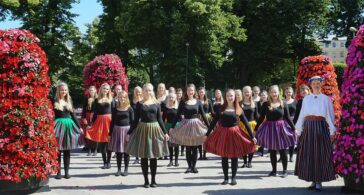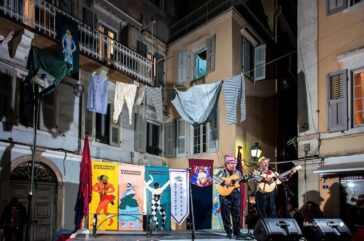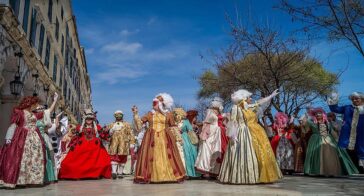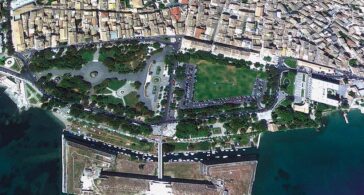Last updated on July 16th, 2025 at 02:41 am
Corfu is more than a destination; it’s a vibrant mosaic of traditions, stories, and rhythms that have endured through centuries.
Corfu’s culture is a dynamic blend of historical influences and local traditions, enriched by its natural beauty and modern developments. The island offers a unique experience that combines historical depth with vibrant contemporary life.
From the island’s musical soul to its colorful festivals, spiritual customs, and evolving way of life, Corfu’s culture weaves the past and present into one living, breathing identity.
This is where heritage isn’t just preserved, it’s celebrated all year round.
Corfu’s Cultural Identity
Corfu’s Role in Greek History
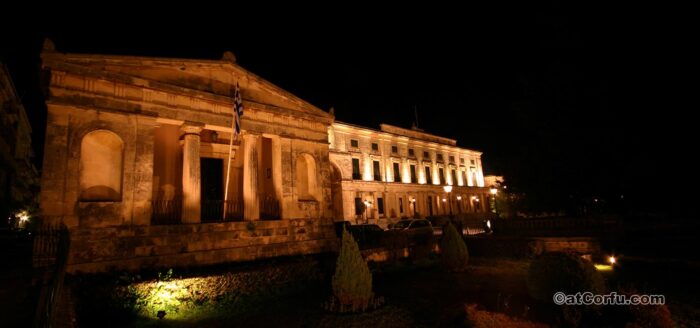
Corfu’s rich culture is inseparable from its layered history. Centuries of occupation by Venetians, French, and British powers left deep marks on the island’s identity, visible in its architecture, institutions, and even its music.
At the same time, Corfu maintained a strong connection to Hellenic traditions, playing a notable role in modern Greek history and education.
From the Ionian Academy to the island’s early push for union with Greece, Corfu has long been a cultural and intellectual outpost.
These diverse historical influences have shaped the unique Corfiot way of life that endures today.
For a deeper look at the major historical milestones and foreign legacies that shaped Corfu:
Visit our main History page
Preserving Cultural Heritage
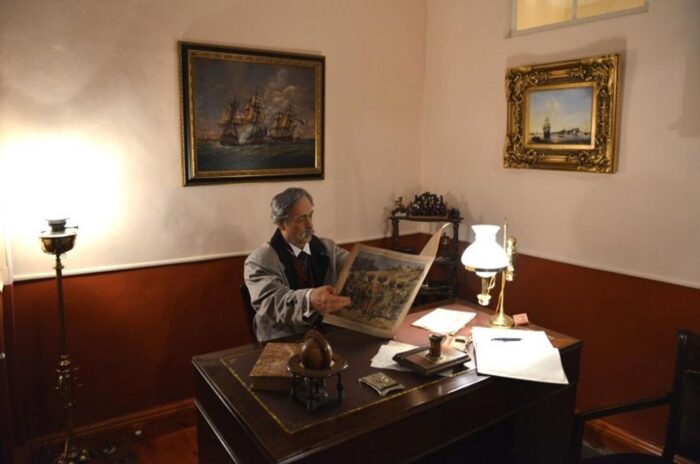
Today, Corfu’s museums and landmarks stand as a testament to its pivotal history, preserving artifacts and narratives that highlight its enduring significance in Greek history and culture.
The island continues to celebrate its cultural diversity, bridging past and present through music, literature, and historical remembrance.
See all Museums hereLifestyle and Traditions

- Hospitality: Corfiots are known for their warm hospitality and friendliness, welcoming visitors with traditional Greek warmth.
- Crafts: Traditional crafts include embroidery, ceramics, and weaving, which reflect the island’s cultural heritage.
Overall, Corfu’s culture is a rich tapestry woven from its varied historical influences, vibrant traditions, and unique local customs, making it a fascinating destination for both history enthusiasts and cultural explorers.
Religion and Spirituality
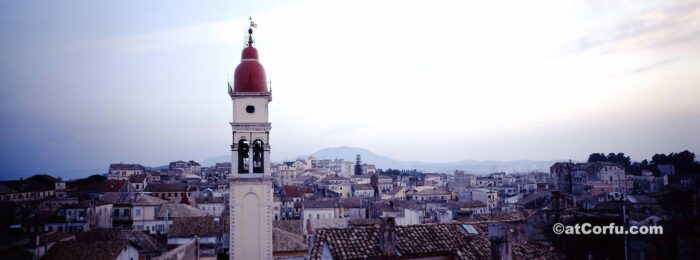
- Orthodox Christianity: Most Corfiots are Greek Orthodox, and religious practices are an important part of daily life. The island has numerous beautiful churches and monasteries, such as the Monastery of Paleokastritsa, which is a significant pilgrimage site.
- Local Saints: Saint Spyridon is the patron saint of Corfu, and his feast day on December 12th is celebrated with great reverence. His relics are housed in the Church of Saint Spyridon in Corfu Town.
Traditional Clothing
Corfiot Attire: Traditional Corfiot costumes, often worn during festivals and special occasions, include elaborate embroidered garments. Men typically wear a “fustanella” (a kilt-like skirt) and a “sariki” (a type of headscarf), while women’s traditional dress often features intricate embroidery and decorative elements.
Arts and Crafts
- Local Art: Corfu has a vibrant arts scene with local artists producing works inspired by the island’s landscapes and cultural heritage. You can find local art galleries and craft shops showcasing paintings, pottery, and handmade jewelry.
- Corfiot Pottery: Traditional ceramics from Corfu are known for their distinctive designs and colors. The pottery often features traditional motifs and is crafted using age-old techniques.
Natural Environment

- Flora and Fauna: Corfu’s natural environment is diverse, with lush vegetation, scenic beaches, and mountainous terrain. The island’s flora includes cypress trees, wildflowers, and aromatic herbs, while its fauna features a variety of bird species and marine life.
- Eco-Tourism: There is a growing interest in eco-tourism and sustainable practices on the island, with initiatives aimed at preserving Corfu’s natural beauty and promoting responsible travel.
Overall, Corfu’s culture is a rich tapestry woven from its varied historical influences, vibrant traditions, and unique local customs, making it a fascinating destination for both history enthusiasts and cultural explorers.
Traditional Architecture
There are tons of Corfu sights, landmarks, and historical monuments, a compilation of the most renowned attractions you can explore in Corfu.
See all monuments hereSee all Monuments here
2. Corfu’s Music, Language & Literature
Corfu boasts a vibrant musical tradition anchored by its renowned philharmonic societies: the Old Philharmonic, Philharmonic of Mantzaros, and Philharmonic of Kapodistrias.
These societies are celebrated for their exceptional concerts, while local bands across villages contribute to the island’s musical tapestry, performing in Corfu Town’s lively atmosphere.
Corfu Musical Tradition and The Ionian School of Music
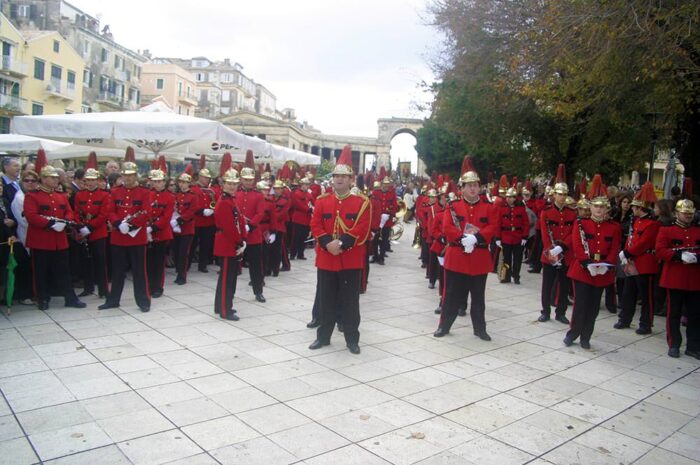
Corfu’s Ionian School of Music emerged in the late 18th century, blending Byzantine, Venetian, and Western influences into a distinct style.
Key figures like Nikolaos Mantzaros and Spyridon Xyndas helped shape modern Greek music by merging Western forms with Greek elements.
Today, Corfu’s musical spirit lives on through its philharmonic societies and vibrant folk traditions, including dances like syrtos and kalamatianos.
The island also boasts a strong literary legacy, home to poets like Solomos and Valaoritis, and a source of inspiration for foreign writers such as Durrell and Miller.
Find out about Musical tradition and IliteratureMelodic Corfu: A Symphony of Culture, Music, and Beauty
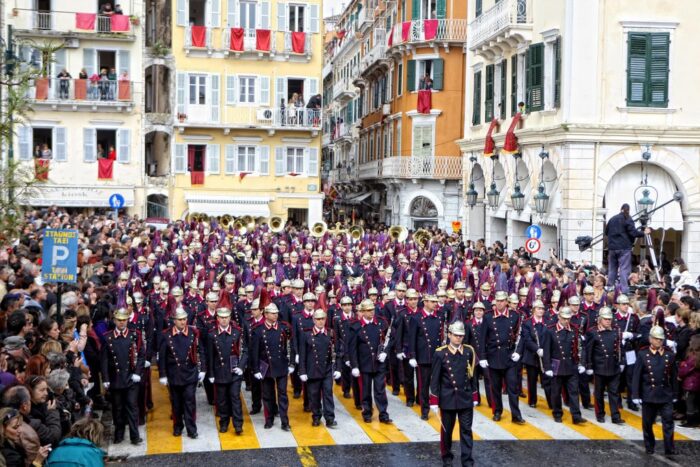
Corfu, the musical heart of Greece, where the very air seems to harmonize with the soulful sounds of music, when musical charm doesn’t stop at instruments and performances only.
Find out moreCorfu Dialect: Interesting, Typical Words

The Corfiot dialect, a Greek language with many Italian-Greek words, forgotten now, that follow Greek grammar and syntax.
See many Corfiot wordsSagrado – What Does This Word Finally Mean?
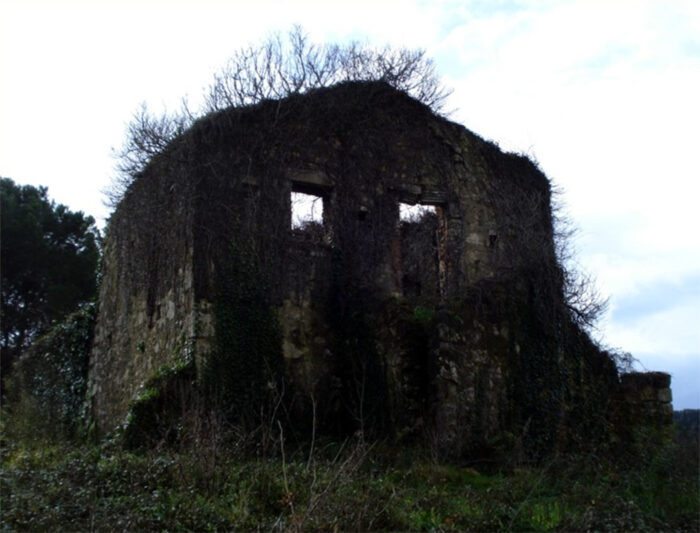
Have you ever heard of Sagrado? No, not the restaurant in Corfu town, but a term that harkens back to Medieval and Venetian times.
Learn everything about Sagrado3. Festivals, Events & Celebrations
Corfu’s calendar is filled with traditional and modern events that reflect both spiritual roots and community joy, from solemn Easter processions to colorful village panigiria and lively carnivals.
Corfu Easter

Experience Easter in Corfu with the impressive traditions, unique events, and the spiritual atmosphere that make the island special during these days.
Spectacular Easter CelebrationsThe Corfu Carnival
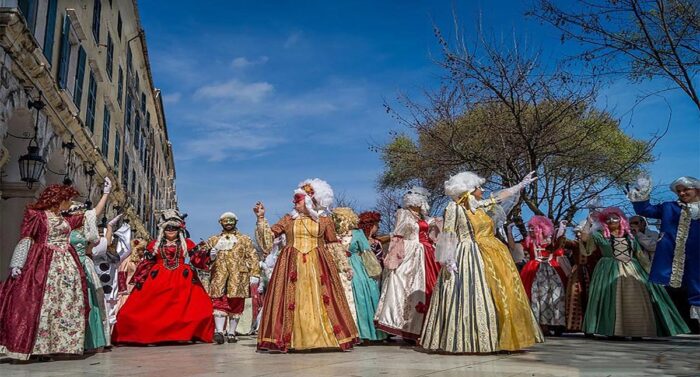
Here in Corfu over the years, the celebrations gained a strong Venetian influence that makes today’s Corfu carnival completely different from those in other parts of Greece. It also demonstrates the innate zaniness of the Corfiots and shows their creativity
See about Corfu CarnivalPetegoletsa
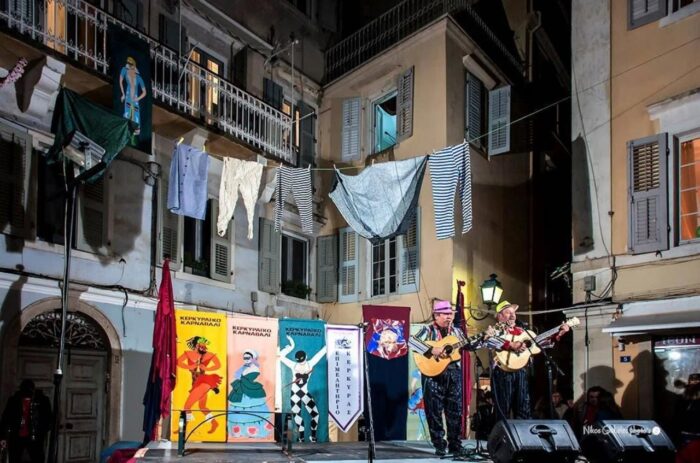
On the last Thursday of the carnival, Corfu has revived a very old tradition, an integral part of the Corfu carnival, which dates from the years of Venetian rule. It is called the Petegoletsia; petegolia is simply the gossip, which means exactly what it says.
See what Petegoletsa isFestivals and Panigiria in the Villages
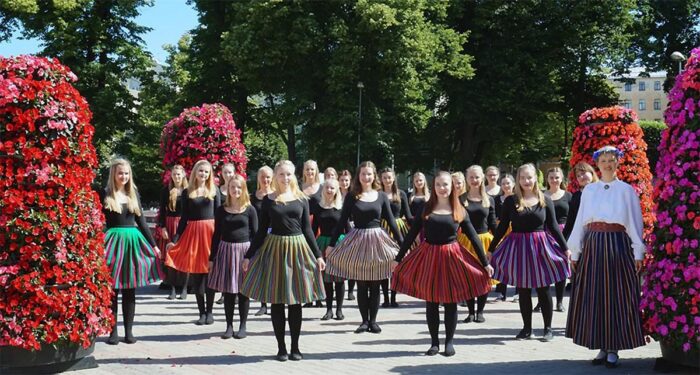
As in Corfu Town, so in the villages- the events of the Carnival are the same, plus a few villages have maintained some fascinating and entertaining traditions.
The Holy Marriage
A humorous village tradition still alive in places like Chlomos and Marathia, where men theatrically dress as both groom and bride—complete with shaving, ashes, and mustaches—reenacting a symbolic wedding filled with teasing, obscenities, and a mischievous demon trying to disrupt the ceremony.
The Custom of the Vlachs
In Argirades, two figures called Vlachs lead the carnival parade with a ritual dance, carrying spring flowers and playfully insisting that bystanders smell them—echoes of ancient Greek fertility rites.
The Dance of the Priests
Unique to Episkepsis, this Shrovetide custom begins with the village priest leading a solemn, music-free dance, followed by men in order of age and rank. Afterwards, the elderly women dance a traditional Corfiot piece, a ritual believed to date back to ancient Maenadic ceremonies.
Festivals of Folkloric Groups
The different festivals that occur throughout Corfu over the year, but mostly in the summer, are endless. If you are in Corfu at the right time, you shouldn’t miss one of those.
Every village has at least 3-4 per year, so with more than 200 villages on the island, one can calculate that there are local festivals and celebrations almost daily.
See about all Festivals in the VillagesConcerts, Performances & Open-Air Events
Corfu Sporting Events (e.g., Corfu Mountain Trail)
4. Modern Culture and Everyday Life
Cuisine
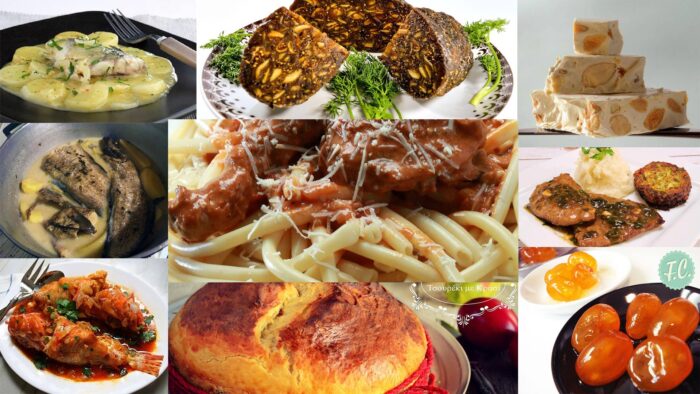
- Local Dishes: Corfiot cuisine reflects a blend of Greek and Venetian influences. Popular dishes include:
- Sofrito: A veal dish cooked in a garlic, vinegar, and white wine sauce.
- Pastitsada: A spicy meat stew with pasta.
- Bourdeto: A fish stew made with tomato, garlic, and hot peppers.
- Sweets: Traditional sweets include:
- Kumquat: The island is famous for its kumquat liqueur and other products made from this fruit.
- Baklava: Although common throughout Greece, Corfu’s baklava often has a unique twist.
Music and Dance in Daily Life
Local Customs and Traditions
Modern Corfu: A Cultural Continuum

- Tourism: Today, Corfu is a popular tourist destination, attracting visitors with its beautiful landscapes, historic sites, and vibrant culture. The tourism industry has brought both opportunities and challenges to the island, influencing its economy and lifestyle.
- Local Events: In addition to major festivals, Corfu hosts various local events and cultural activities throughout the year, including art exhibitions, music performances, and food festivals.
Experience the Culture Firsthand
- Attend a local festival or celebration, like the Corfu Carnival or village feast days (panigiria).
- Explore Corfu’s rich musical traditions by enjoying philharmonic band performances or folk dances.
- Visit museums and cultural venues such as the Museum of Asian Art or the Solomos Museum.
- Taste authentic Corfiot cuisine at local tavernas or food festivals—try dishes like sofrito and pastitsada.
- Take a walk through traditional villages like Lakones or Old Perithia to experience island life and customs.
- Learn a few words of the Corfiot dialect, influenced by Italian and Greek heritage.
- Engage with locals in cafés or markets for a genuine cultural exchange.
Wrap-Up
Corfu’s culture isn’t just history — it’s lived every day in its music, traditions, and vibrant local festivals. Explore the links above to discover what makes Corfu’s spirit so unique.
More Corfu events
Festivals and Panigiria in the Villages of Corfu
Experience authentic Corfiot culture at traditional village festivals (panigiria) with local food, music, and heartfelt celebrations year-round.
Gossip with a Twist: Corfu’s Petegoletsa Tradition
On the last Thursday of the carnival, Corfu has revived a very old tradition, an integral part of the Corfu carnival, which dates from the years of Venetian rule. It is called the Petegoletsa.
Corfu Carnival: Echoes of a Venetian Past
The Ancient celebrations in early spring that took place in honor of Dionysus, god of wine and fun, hoping for a good harvest and successful husbandry, are the forerunners of today’s carnival in Greece.
What is Corfu best known for?
Beyond its natural beauty, what is Corfu famous for? as a melting pot of various civilizations, is famous for its architecture, traditions, and cuisine.
Corfu Musical Tradition – Literature and Intellectuals
Corfu’s rich cultural heritage features a strong musical and literary traditions that continue to shape the island’s cultural identity until today.
Melodic Corfu: A Symphony of Culture, Music, and Beauty
Corfu, the musical heart of Greece, where the very air seems to harmonize with the soulful sounds of music when musical charm doesn’t stop at instruments and performances only.


